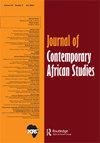Ghana’s democracy and the digital public sphere: some pertinent issues
IF 0.8
Q2 AREA STUDIES
引用次数: 1
Abstract
Ghana’s media has been one of the biggest bulwarks of its nascent democracy since the transition to democratic rule in 1992. What has become known as the Fourth Estate of the Realm is now gradually being digitally networked as a result of the emergence of new media technologies. Using existing data mostly from media think-tanks such as Penplusbytes, Media Foundation for West Africa (MFWA), media and other online sources, this paper appraises the role of digital media in the process of consolidating Ghana’s democracy under the Fourth Republican Constitution within the lens of Habermas’ concept of the public sphere. The study focuses on the 2016 and 2020 general elections of Ghana and analyses the influence of digital media in strengthening democratic values such as political participation, activism and public opinion formation. We conclude that the Habermasian model of the structural transformation of the public sphere (1962) is partly applicable to the Ghanaian media landscape. Although challenges such as the elite stranglehold on the traditional media landscape have been widespread since the beginning of the political transition in 1992, the emergence of the new media has brought new and complex dimensions to the debate. Specifically, while new media platforms have made immense contributions towards enhancing a general liberal environment, they suffer from several drawbacks such as unequal participation and lack of uniformity in public deliberations, with elites and other powerful social and economic actors generally holding sway. The phenomenon of fake news, online disinformation, the issue of digital divide, creeping state repression and COVID-19 restrictions during the 2020 election period have all combined to hamstring the Ghanaian new media which is currently at the center of a seemingly endless process of structural transformation.加纳的民主和数字公共领域:一些相关问题
自1992年向民主统治过渡以来,加纳的媒体一直是其新生民主的最大堡垒之一。由于新媒体技术的出现,被称为王国第四等级的人现在正逐渐被数字化网络化。本文利用媒体智库(如Penplusbytes)、西非媒体基金会(media Foundation for West Africa, MFWA)、媒体和其他在线资源的现有数据,在哈贝马斯的公共领域概念的视角下,评估了数字媒体在第四共和国宪法下巩固加纳民主进程中的作用。该研究侧重于2016年和2020年的加纳大选,并分析了数字媒体在加强民主价值观方面的影响,如政治参与、行动主义和舆论形成。我们的结论是,公共领域结构转型的哈贝马斯模型(1962)部分适用于加纳的媒体景观。尽管自1992年政治转型开始以来,精英阶层对传统媒体格局的束缚等挑战一直很普遍,但新媒体的出现为这场辩论带来了新的、复杂的维度。具体来说,虽然新媒体平台在提升总体自由环境方面做出了巨大贡献,但它们也存在一些缺点,比如参与不平等,公众审议缺乏一致性,精英和其他强大的社会和经济行为者通常占据主导地位。假新闻现象、网络虚假信息、数字鸿沟问题、国家压制的蔓延以及2020年大选期间对COVID-19的限制,所有这些都阻碍了加纳新媒体的发展,而加纳新媒体目前正处于看似无休止的结构转型过程的中心。
本文章由计算机程序翻译,如有差异,请以英文原文为准。
求助全文
约1分钟内获得全文
求助全文
来源期刊

Journal of Contemporary African Studies
AREA STUDIES-
CiteScore
2.20
自引率
0.00%
发文量
18
期刊介绍:
Journal of Contemporary African Studies (JCAS) is an interdisciplinary journal seeking to promote an African-centred scholarly understanding of societies on the continent and their location within the global political economy. Its scope extends across a wide range of social science and humanities disciplines with topics covered including, but not limited to, culture, development, education, environmental questions, gender, government, labour, land, leadership, political economy politics, social movements, sociology of knowledge and welfare. JCAS welcomes contributions reviewing general trends in the academic literature with a specific focus on debates and developments in Africa as part of a broader aim of contributing towards the development of viable communities of African scholarship. The journal publishes original research articles, book reviews, notes from the field, debates, research reports and occasional review essays. It also publishes special issues and welcomes proposals for new topics. JCAS is published four times a year, in January, April, July and October.
 求助内容:
求助内容: 应助结果提醒方式:
应助结果提醒方式:


